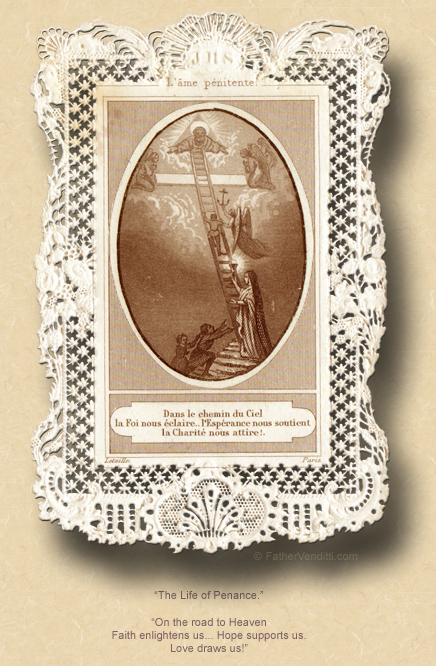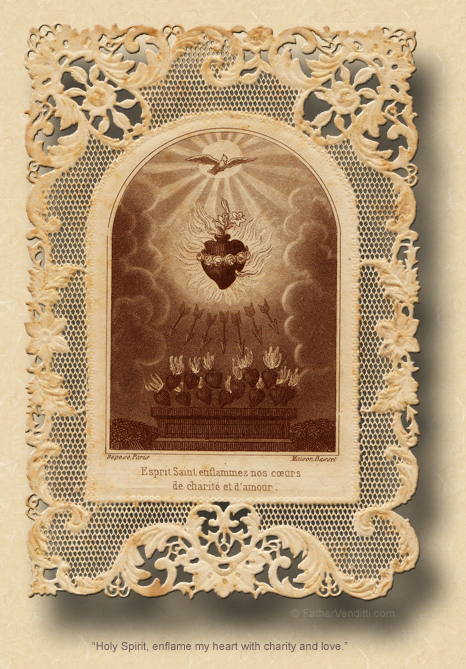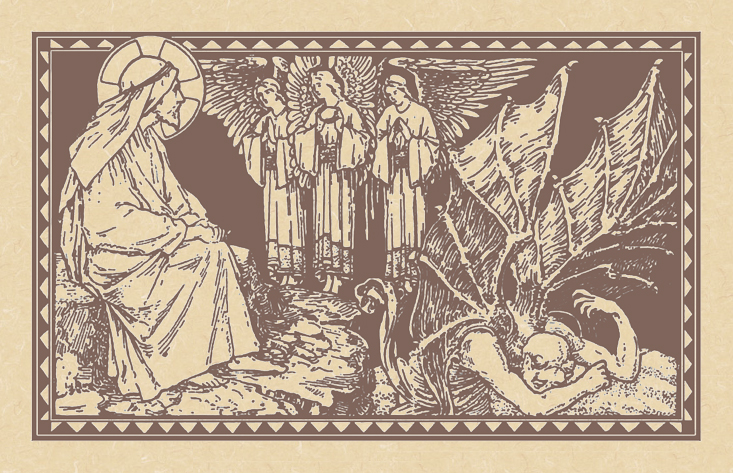The Leaven of Malice in the Bread of Our Souls.
The First Sunday of Lent.
Lessons from the primary dominica, according to the ordinary form of the Roman Rite:
• Genesis 2: 7-9; 3: 1-7.
• Psalm 51: 3-6, 12-13, 17.
• Romans 5: 12-19.
[or, Romans 5: 12, 17-19.]
• Matthew 4: 1-11.
Lessons from the dominica, according to the extraordinary form of the Roman Rite:
• II Corinthians 6: 1-10.
• [Gradual] Psalm 90: 11-12.
• [Tract] Psalm 90: 1-7, 11-16.
• Matthew 4: 1-11.
FatherVenditti.com
|
 5:43 PM 3/1/2020 — The temptation of our Blessed Lord in the desert comprises our Gospel lesson for the First Sunday of Lent, and it's chocked full of theological and spiritual implications as our Lord and the Devil try to one-up each other with quotes from the prophets. To look into this passage line by line would be fruitful indeed; it would also take until Thursday. I think it might be more beneficial for us to take a more pragmatic approach, and just take one very simple point, one that I made for those who were here for Holy Mass on Ash Wednesday, and which I hope is a fitting opening salvo for our journey into Lent. 5:43 PM 3/1/2020 — The temptation of our Blessed Lord in the desert comprises our Gospel lesson for the First Sunday of Lent, and it's chocked full of theological and spiritual implications as our Lord and the Devil try to one-up each other with quotes from the prophets. To look into this passage line by line would be fruitful indeed; it would also take until Thursday. I think it might be more beneficial for us to take a more pragmatic approach, and just take one very simple point, one that I made for those who were here for Holy Mass on Ash Wednesday, and which I hope is a fitting opening salvo for our journey into Lent.
In the Eastern Churches—including the Ruthenian Catholic Church in which I served for many years—the last two weeks before Lent have very peculiar sounding names: Meatfare week and Cheesefare week, Meatfare being the last week during which they eat meat, and Cheesefare being the last week they eat dairy products, abstaining from both throughout the whole of Lent; quite a far cry from the simple abstinence from meat on Friday that the Latin Church requires from us. Those two weeks call the faithful of those Churches to focus on very concrete things for a reason. Jesus didn’t just sit down and think about what it would be like to fast for forty days in the desert, and then contemplate how that might change him; he actually went there and actually fasted. And while we might be thankful that we are not Eastern Catholics and don't have to do that kind of fasting, the relevancy of that example should not be dismissed out of hand. If my Lent consists of: “I’ll give up desserts; I’ll cut an hour of my TV time; I’ll say an extra ten minutes of prayers each night…,” that’s nice, but it’s not Lent, because it’s all just symbolic. That's why I've never been a particular fan of the pedestrian notion of “giving up something” for Lent. A symbol, whether it be a picture or a word or a symbolic act, no matter how meaningful it may seem to us, is still just a ghost. If it has no substance, it cannot change me concretely. But if my Lent is not just a symbol, if it is something which I allow to completely reorient my life, turning me away from the things of this world toward the things of God to the extent that my state if life permits, then over the course of a lifetime of Lents it can make the difference between heaven and hell. And that—at the risk of sounding amusingly tempered—is not insignificant.
Think back to the Gospel lesson for Ash Wednesday itself (Matt. 6: 1-6, 16-18), some pragmatic admonitions by our Lord about the sincerity of our penitential acts: don't make a show in giving alms, don't make a spectacle of yourself when you pray, don't alter your appearance so everyone can see your mortification; nothing that we all don't know instinctively, though it does sometimes lead us to be a little judgmental of others. We may have gone to work or to the store on Ash Wednesday and seen people walking around with enormous crosses of ash smeared on their foreheads, and perhaps found ourselves thinking, “Is that person really living a Christian life, or is he or she just thinking superstitiously, that getting ashes smeared on his head is some kind of magic charm that will protect him from “cooties”?  Then perhaps we realized that that kind of judgmental-ism is not at all in the spirit of Lent, and we stopped ourselves. This happens to me all the time, with all the simple souls who visit our Shrine here at different times during the pilgrimage season, singing in front of the statues out loud, or crying out prayers at the top of their lungs for all to hear. But then I have to stop myself and recognize that I don't have the gift of knowledge like the Curé of Ars, with the ability to see into someone's soul. I can shut them up because they're disturbing the prayer of others, but I can't judge them. Then perhaps we realized that that kind of judgmental-ism is not at all in the spirit of Lent, and we stopped ourselves. This happens to me all the time, with all the simple souls who visit our Shrine here at different times during the pilgrimage season, singing in front of the statues out loud, or crying out prayers at the top of their lungs for all to hear. But then I have to stop myself and recognize that I don't have the gift of knowledge like the Curé of Ars, with the ability to see into someone's soul. I can shut them up because they're disturbing the prayer of others, but I can't judge them.
During the season of Lent, we're going to be getting a lot of Scripture lessons at Holy Mass like today's, lessons that pertain to mortification, fasting, prayer and sincerity in our actions; and, when we hear them, the temptation will always be to apply them to everyone but ourselves: we'll be sitting in the pew and hear our Lord say something, and the first thing that pops into our head is, “Gee, I hope So-and-so heard that”; we often don't bother to ask whether we heard it ourselves. It reminds me of something I learned very early on when I was first discerning my vocation, and had experimented with the monastic life among the Carthusians, a community of hermits founded by Saint Bruno, and this story you've heard before. In his monastic rule, written in the year 1050, he makes a statement that I believe can be adapted as a suitable item for anyone's examination of conscience, particularly during Lent: he says that, whenever you see a brother doing anything that is forbidden,—whether it's conversing with a woman, or entering a shop, or eating meat, or anything at all that the rule forbids the monks to do—instead of running to the prior to “rat him out,” just assume he has permission; your job is to purify your own soul, not to police someone else's.
Last Wednesday we began this holy season by blessing ashes made from the burning of the palms from last year's Palm Sunday; and, in a tradition that goes back a thousand years, we were marked with those ashes as a symbol of our desire to do penance and purify our lives. But, like all symbols, it has the potential to be meaningless if we receive it in a superstitious way, or if it's just there for others to see. Personally, I always wash mine off after Mass every Ash Wednesday, especially after what our Lord said in the Gospel that day about washing your face and not altering your appearance. I like the new translation, in which our Lord says, “anoint your head and wash your face”; the old translation said, “wash your face and comb your hair,” which didn't mean a whole lot to me.  But whether we washed them off or left them there as we went about the rest of our day, I hope none of us forgot that the mark on our heads does no good if it is not accompanied by a mark on our souls; and, the best way to determine that is how we treat and judge those we meet along the way. But whether we washed them off or left them there as we went about the rest of our day, I hope none of us forgot that the mark on our heads does no good if it is not accompanied by a mark on our souls; and, the best way to determine that is how we treat and judge those we meet along the way.
The Sundays of Lent are unique in that have their own prefaces to introduce the Canon; and, as you will hear, the priest will sing:
By abstaining forty long days from earthly food, he consecrated through his fast the pattern of our Lenten observance and, by overturning all the snares of the ancient serpent, taught us to cast out the leaven of malice….
And malice is like yeast: once it gets into our souls, it rises and fills our whole being as we bake in our own animosity.
So, I would like to recommend to you a simple Lenten observance, one that comes right out of the Rule of Saint Bruno, because it comes right out of the Holy Gospel: begin your Lent by counting the number of people in your life that you will have nothing to do with—because they once did something to hurt you, because you feel they once betrayed you, or because they're not living the way you think they should, or maybe because you just don't like the looks of them—count them; and, if, by the end of Lent, you can succeed in lowering that number, that will be the extent to which you have made yourself more pleasing to God than you were before.
Naturally, this is by no means our only task during Lent: examining our consciences against the Commandments of God, confessing our sins, purifying ourselves by prayer and fasting—all of this is part of our daily struggle against the devil as prefigured by our Lord's confrontation with him in the desert.
The whole of man's history [says the Catechism of the Catholic Church, in a particularly poignant passage] has been the story of dour combat with the powers of evil, stretching, so our Lord tells us, from the very dawn of history until the last day. Finding himself in the midst of the battlefield man has to struggle to do what is right; and, it is at great cost to himself, and aided [only] by God's grace, that he succeeds in achieving his own inner integrity (CCC, 409).
The question for us is: are we willing to pay that cost? And the answer to that question, I think, might lie in observing how we choose to treat one another. All of us are sinners; of that there is no doubt. But, as we pray every day—and will again in this Holy Sacrifice of the Mass—“Forgive us our trespasses as we forgive those who trespass against us.”

|

